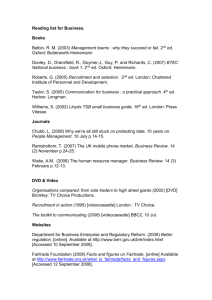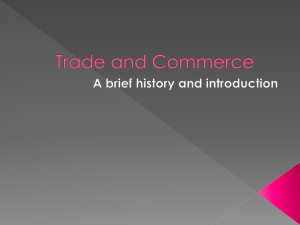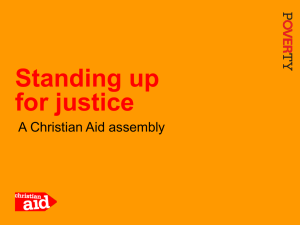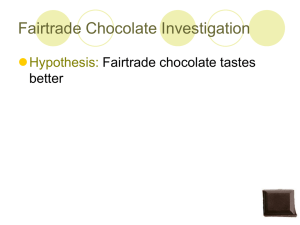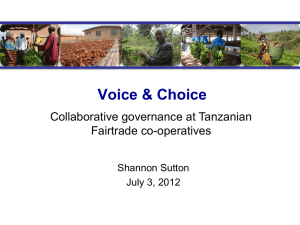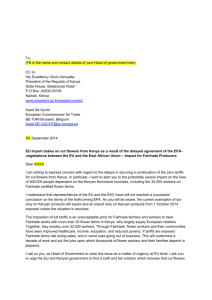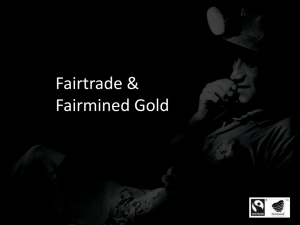Ethical Business
advertisement
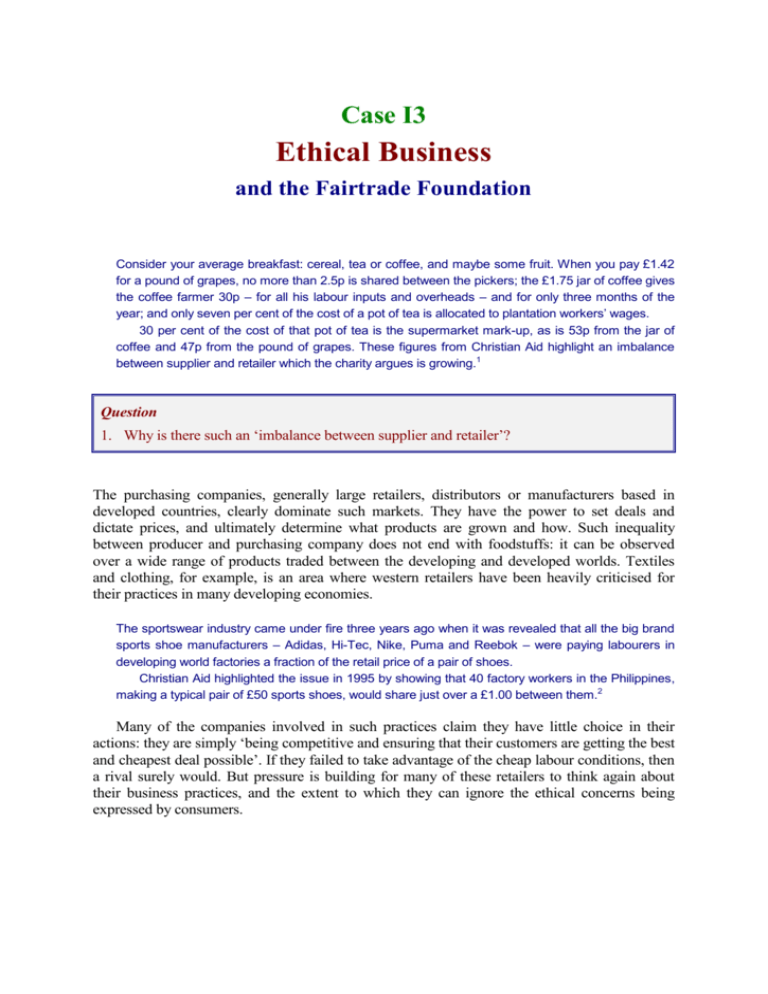
Case I3 Ethical Business and the Fairtrade Foundation Consider your average breakfast: cereal, tea or coffee, and maybe some fruit. When you pay £1.42 for a pound of grapes, no more than 2.5p is shared between the pickers; the £1.75 jar of coffee gives the coffee farmer 30p – for all his labour inputs and overheads – and for only three months of the year; and only seven per cent of the cost of a pot of tea is allocated to plantation workers’ wages. 30 per cent of the cost of that pot of tea is the supermarket mark-up, as is 53p from the jar of coffee and 47p from the pound of grapes. These figures from Christian Aid highlight an imbalance between supplier and retailer which the charity argues is growing.1 Question 1. Why is there such an ‘imbalance between supplier and retailer’? The purchasing companies, generally large retailers, distributors or manufacturers based in developed countries, clearly dominate such markets. They have the power to set deals and dictate prices, and ultimately determine what products are grown and how. Such inequality between producer and purchasing company does not end with foodstuffs: it can be observed over a wide range of products traded between the developing and developed worlds. Textiles and clothing, for example, is an area where western retailers have been heavily criticised for their practices in many developing economies. The sportswear industry came under fire three years ago when it was revealed that all the big brand sports shoe manufacturers – Adidas, Hi-Tec, Nike, Puma and Reebok – were paying labourers in developing world factories a fraction of the retail price of a pair of shoes. Christian Aid highlighted the issue in 1995 by showing that 40 factory workers in the Philippines, making a typical pair of £50 sports shoes, would share just over a £1.00 between them.2 Many of the companies involved in such practices claim they have little choice in their actions: they are simply ‘being competitive and ensuring that their customers are getting the best and cheapest deal possible’. If they failed to take advantage of the cheap labour conditions, then a rival surely would. But pressure is building for many of these retailers to think again about their business practices, and the extent to which they can ignore the ethical concerns being expressed by consumers. Questions 2. Given the obvious high price mark-up on, for example, a pair of sports shoes, how justifiable are the claims made by the shoe manufacturers for the maintaining of such low labour costs? 3. One strategy producers might adopt to strengthen their bargaining position with western buyers and retailers is to form a producers’ cartel. What difficulties might producers experience in maintaining and operating such an arrangement successfully? The major UK supermarket chains, Sainsbury’s, Tesco, Safeway and, in particular, the Co-op, have all given indications about their willingness to take ethical issues into account when dealing with Third World producers. The question is, how far will such ethical concerns shape their actions and business deals? It is clear that the major supermarkets see a potential competitive advantage in proclaiming their ethical awareness. Sainsbury’s has declared its desire to embrace the international fair trading standards proposed by the Fairtrade Foundation. The Fairtrade Foundation was set up by Christian Aid, New Consumer, Oxfam, Traidcraft Exchange and the World Development Movement in 1992. Question 4. What difficulties might there be in creating and maintaining an international fair-trading standard? The Fairtrade Foundation’s role is to recognise and endorse fairly traded products, and, in certain cases, provide up-front finance for Fairtrade business ventures. The sales of the first Fairtrade product, Maya Gold chocolate, exceeded even the most optimistic forecasts. Within a month of its trial run in Sainsbury’s stores, distribution was extended to the rest of the major supermarkets including Tesco and Safeway. Heightened consumer interest in the ‘ethical’ chocolate led Sainsbury’s and Safeway to take the unusual step of displaying the manufacturer’s leaflet at point of sale. ..... The next product to take the Fairtrade Mark, Cafédirect coffee, has been a remarkable success as the first fairly traded product to achieve mainstream distribution. Available in all the major supermarket chains, it has gained a 2.8 per cent market share.3 The clear market success of these products has revealed that consumers are willing to pay a premium for ethically produced goods. Opinion polls conducted by NOP for Christian Aid (1993) and SuperMarketing (1994) revealed that the majority of consumers would be willing to pay more for fair traded products. The average extra amount that people were prepared to pay was 25p on an item that normally costs £1.00, and 32p extra on an item that normally costs £2.00. At both price levels, women were prepared to pay more than men; on average, pay 29p extra on a £1.00 item and 36p on a £2.00 item.4 2 The difficulty retailers face is in deciding how far the ‘ethical’ burden of higher prices should fall upon the consumer? As Jo-Anne Walker of Marketing Week suggested: Consumers may accept paying more money for one or two brands, but if retailers insist on maintaining their enormous profit margins and passing on the costs of ethical business practices to the consumer shopping bills will see a significant price hike. But if supermarkets claims that consumers will have to pay begins to ring hollow, then consumers may start to shop elsewhere – especially if one of the chains takes a more definite ethical stand to distinguish itself from the crowd.5 Recent developments Since these observations in the late 1990s, Fairtrade sales have continued to grow, increasing by a remarkable 493 per cent between 2000 and 2005. In 2005 alone shoppers in the UK spent £195 million on food products with the Fairtrade Mark: see following table. Sales of Fairtrade products in the UK (retail value: £ million) 1998 1999 2000 2001 2002 2003 2004 2005 13.7 15.0 15.5 18.6 23.1 34.3 49.3 65.8 Tea 2.0 4.5 5.1 5.9 7.2 9.5 12.9 16.6 Chocolate/cocoa 1.0 2.3 3.6 6.0 7.0 10.9 16.5 21.9 Honey products n/a <0.1 0.9 3.2 4.9 6.1 3.4 3.5 Bananas n/a n/a 7.8 14.6 17.3 24.3 30.6 47.7 Other n/a n/a n/a 2.2 3.5 7.2 27.3 39.5 Total 16.7 21.8 32.9 50.5 63.0 92.3 140.8 195.0 Coffee Source: www.fairtrade.org.uk/about_sales.htm In 2005, worldwide sales of Fairtrade certified products were €1.1 billion – a 37 per cent increase on the previous year. Not surprisingly Fairtrade foods have also diversified since its launch; it now promotes over 130 different Fairtrade products, from pineapples and mangoes to chocolate cakes and Christmas cookies. However, it is with four products: tea, coffee, chocolate/cocoa and bananas that the Fairtrade label achieves most success. With Cafédirect, the foundation now supplies the UK’s 6th largest coffee brand, with over 4 per cent of the instant coffee market. By 2006, there were 39 companies producing Fairtrade coffee and there were over 200 different Fairtrade roast and ground coffees available in the shops (18 per cent of this market). Sales of Clipper Fair Trade Tea have grown rapidly and by 2006 Clipper was the market leader in green and white teas. In addition to supplying coffee and tea through such brands, the Fairtrade Foundation has also been able to tap into the recent boom in coffee shops. Three of the largest coffee shop outlets, Costa, Starbucks and Pret A Manger, now offer customers Fairtrade tea and coffee. Fairtrade bananas now account for 5 per cent of the UK banana market. Such has been the growth in the Fairtrade Mark that consumer awareness of the mark and what it stands for has risen significantly. In 2005, a MORI poll commissioned by the Foundation found that 50 per cent of those interviewed knew what the mark stood for. This compares with figures of 25 per cent for 2003 and 39 per cent for 2004. Four out of five people who recognise the Mark say its independent guarantee of a fair deal for growers in developing countries is ‘very’ or ‘fairly’ important. The strongest feelings about the 3 independent guarantee exist among 25-34 year olds and those who regularly purchase Fairtrade products. Over half of them (52%) feel it is ‘very’ important. 6 But what of the growers in developing countries? How has the Fairtrade movement helped them? Today, there are 370 certified producer organisations, representing almost 500 first level producer structures, and over 800,000 families of farmers and workers (which we estimate as being 5 million people), coming from over 45 countries in Africa, Asia and Latin America.7 In 2003, coffee prices averaged 65 cents a pound for Arabica. By contrast the Fairtrade price for Arabica coffee was $1.26. The small additional amount consumers pay for Fairtrade foods goes a very long way.8 1 2 3 4 5 6 7 8 ‘Growing Pains’, Marketing Week, April 3 1997 Ibid. Fairtrade website. Web address http://www.fairtrade.org.uk/ Ibid. ‘Growing Pains’, Marketing Week, April 3 1997 http://www.fairtrade.org.uk/pr270505.htm http://www.fairtrade.org.uk/about_sales.htm http://www.fairtrade.org.uk/downloads/pdf/Fairtrade_highlights_2003.pdf 4
